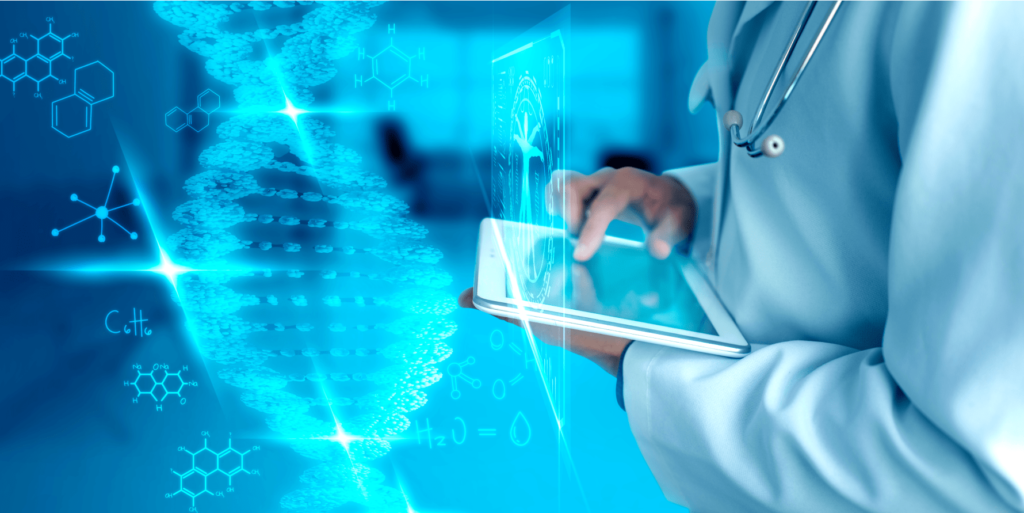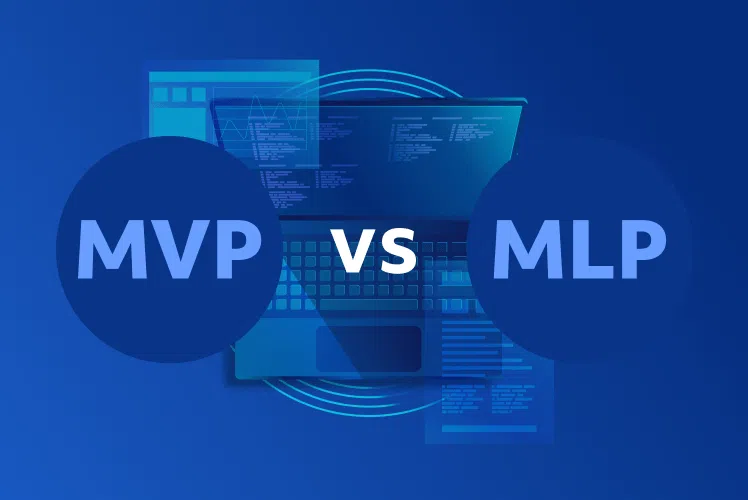Table of Contents
The healthcare industry is one of the most demanding in terms of deploying innovative technologies due to the need for efficient tools for data collection and processing. Data science provides the healthcare industry with several valuable solutions that not only facilitate data management but offer a fresh take on it. Let’s have a look at the most popular use cases of data science in healthcare and the ways it reshapes the industry.

Data scientists in healthcare: a quick recap of the role
As we discussed in one of our previous articles, a data scientist is a person responsible for studying the data and extracting valuable insights from it. So where does a data scientist fit in healthcare and how is data science used in healthcare?
The healthcare industry processes massive amounts of data on a daily basis. This data comes from wearables, electronic health records, and medical images, is exchanged between the departments and is stored in both electronic and physical formats. Therefore, one needs a sophisticated and powerful tool not only to process but to analyze it as well. This is where a data scientist in medical field operates. These professionals step in and use their skills and knowledge to design ML-based models for efficient data analysis. These models are capable of thorough and deep analysis and prove to deliver high-quality and accurate results. An example would be the detection of certain conditions by screening a medical image or predictive analytics for disease prevention.
The benefits of data science in healthcare
Taking into consideration the fact that the smallest piece of information in healthcare can literally save a life, it’s obvious that the importance of proper data processing and analysis is incredibly high. Let’s list the biggest benefits of using data science in medicine:
- Faster and more accurate data processing: this includes processing of EHRs (electronic health records) and medical images;
- Identification of warning indicators (i.e. disease symptoms) among patients;
- Assistance in diagnostics;
- Reduced risk of wrong treatment and more accurate treatment selection;
- Improved patient care.
The use cases of data science in healthcare
While the general purpose of applying data science to healthcare is better and faster data processing, there are several specific use cases to know about.
Genome research
Genomics is the study of an entire organism’s genes and DNA and their sequencing. Thanks to genomics, medical scientists learn more about how a disease impacts one’s organism or how this organism responds to a specific drug. Needless to say, genomics is a vital field of study but it’s also very challenging due to millions of cells in a human body that need to be studied and analyzed.
Data science made a significant contribution in studying genes and DNA. Due to its capability of almost instant processing of terabytes of data and the independent research of patterns and dependencies, machine learning technology is now one of the primary tools to use in genomics. It allows medical scientists to study DNA sequencing and genes much faster, minimizes the number of possible errors, and helps accurately determine the relationships and dependencies between genes and drugs or diseases. This, in turn, has a long-term impact on creating drugs for hardly curable or non-curable diseases.
Drug research
This point is related to the one discussed above. Drug research has always been a cumbersome and long-term process as it involves a number of critical steps, like identifying the best components and their combinations and then examining how they will react in real life.
Thanks to machine learning and predictive analytics, medical scientists can now significantly speed up the drug research process. It has now become easier not only to analyze the components and their compatibility but also to forecast the possible reactions of an organism and the possible effects of a drug. Hence, data science in healthcare can cut off several years of manual drug research and it can significantly reshape the way scientists work on drugs and their effects.
Expert Opinion
The use of data science in healthcare is, without a doubt, growing exponentially and we can already witness impressive applications of this technology in real-life use cases. The most interesting one is probably AlphaFold, an AI tool that was awarded the Chemisry Nobel 2024. AlphaFold is able to predict the three-dimensional structure of proteins from their amino acid sequences, which was nearly impossible for decades.
As Demis Hassabis, one of the three winners and a researcher behind AlphaFold says, AlphaFold can be called the first proof point of AI’s potential in scientific discovery. That being said, I’m sure we will be seeing even more revolutionary AI-based tools that will change the way the healthcare industry operates for the better.
Image analysis
Medical images such as X-ray images are the primary source of important information about the patient’s health. However, it’s quite challenging to identify minor deviations manually, without specialized tools. But if you apply computer vision, things instantly get better.
Computer vision software is capable of deep image analysis and performs much better than people in terms of accuracy of screening. Here are some useful functions of computer vision:
- Detection of deviations and anomalies related to diseases;
- Image denoising and processing;
- Image interpretation and recognition.
As you see, computer vision (aka the subset of data science) adds more clarity and accuracy to the process of image processing and serves as a valuable asset.
Predictive analytics
Another great use case of medical data science is predictive analytics. Predictive analytics plays an important role in the development of the healthcare industry. Due to the capability of ML-based models to draw forecasts and predict the behavior of one’s organism or its reaction to a drug, medical scientists can better understand the development of diseases, the possible reaction to a drug, possible health risks, and much more. Here is how predictive analytics contributes to healthcare:
- Predicts one’s condition and possible development of disease;
- Helps calculate the possibility of disease to occur;
- Predicts the behaviour of a certain drug and its impact on one’s organism;
- Helps better manage pharmaceutical logistics.
Patients’ health monitoring
Remember we mentioned wearables as one of the primary data sources? Such devices as smartwatches, for example, can produce a lot of useful data: heartbeat, blood pressure, body temperature, etc. All this data can be collected, added to one’s health record, and used for diagnostics and treatment.
Data science contributes to better patients’ monitoring by providing tools, necessary for accurate management of the collected data. One of the most common tools is the IoT technology that is responsible for the data collection and AI for data processing and automation of certain tasks.
Smart virtual assistants
One more use case of data science for healthcare is the development of smart, AI-powered virtual assistants (similar to Siri or Alexa). A good example would be a mobile application that a patient can interact with. The basic functions of such an app normally include:
- Regular reminders about the medicine intake;
- Contacting doctors in case of an emergency (after analyzing the patient’s state);
- Monitoring the patient’s state;
- Voice and image recognition for better health monitoring;
- Psychological assistance (to a certain extent).
Note that the use of such apps can also contribute to the reduction of admission and readmission costs as the patients can monitor their health from home and contact the hospital only in case of acute emergency. While a virtual assistant cannot fully replace a medical professional, it can at least provide minimal care and guidance so a patient can always be informed on the state of their condition.
Summary
Data science in healthcare plays an important role as it fully unveils the data and introduces new approaches to its analysis and use. While there is still a long way to go, the healthcare industry is already seeing a major transformation in terms of its processes and technologies used. We can only guess how the industry will transform in ten (or even five) years but for now, data science seems to be its trump card.
And there are already numerous software solutions in the market that allow introducing data science to your organization in a smooth and efficient way. There is also an option of custom development in case your organization has particular needs and specific requirements – contact us to learn more about each option and the possible solutions that you can get.


Comments